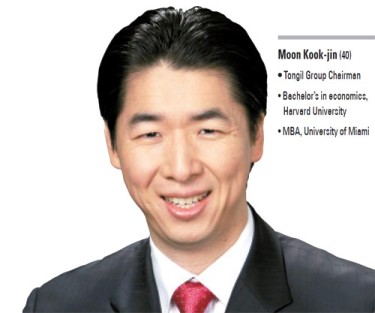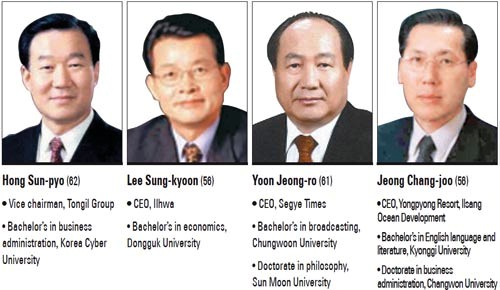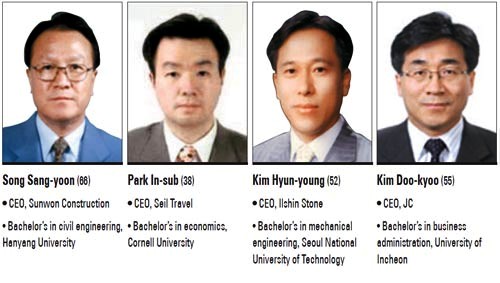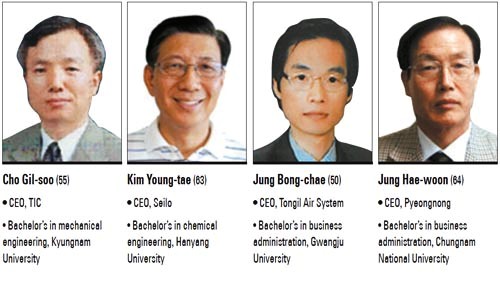![]()
The Words of Kook Jin Moon
|
|
The Words of Kook Jin Moon |

[The faces inside KOREA'S CONGLOMERATES] Once near dissolution, Tongil Group has been resurrected to the cusp of profitability by new CEO Moon Kook-jin.
Tongil, or unification in Korean, means different things to different people.
Some associate it with the reunification of the peninsula, while others might think of Tongilgyo, the Unification Church, a powerful religious sect whose believers number at least three million worldwide. While even most Americans have probably heard of the Unification Church founded by Reverend Moon Sun-myung, chances are not many know Tongil Group, the Unification Church's business empire in Korea whose ventures stretch from manufacturing to tourism and newspaper publishing.
For instance, Yongpyong Resort in Pyeong-chang County, Gangwon, frequented by many Koreans especially during the skiing season, is one of the group's key businesses.
Tongil Group was founded by Reverend Moon on Oct. 4, 1963, nine years after he proclaimed himself the messiah and officially established the Unification Church in Seoul. The group started as a nonprofit whose gains were all to be pumped into the religious and educational activities of the church, and its core business back then was manufacturing, under affiliates that included Tongil Heavy Industries, Hankook Titanium and Ilsung Construction, among others.
In coming years, Tongil Group expanded into drugs, tourism and publishing. In 1971, it established Ilhwa, which makes pharmaceuticals, ginseng tea and the famous barley drink called McCol. In 1985, Tongil established Seil Travel, and in 1988, the top 10 daily newspaper Segye Times (Segye Ilbo) launched. The group also strengthened its presence in manufacturing, setting up Ilshin Stone in 1971 and Tongil Industries Company, or TIC, in 1988.

Yongpyong Resort in Pyeongchang, Gangwon is one of Tongil Group's key sources of revenue. Provided by the group Tongil Group was hit hard by the financial crisis that engulfed Asia in the late 1990s. In 1998, five of the group's affiliates -- including Tongil Heavy Industries, which was its flagship affiliate at the time -- went into receivership. Poor management led to deterioration in the following years, so much so that in 2004, the group was saddled with some 40.9 billion won ($36.6 million) in debt. Group officials today look back on that sober time and say the group came very close to dissolution.
"Tongil Group was founded to support the activities of the Unification Church, but in those years it was the other way around - business was so bad that Unification Church ended up supporting the work of Tongil Group," said Ryu In-yong, a Tongil public relations manager.
But a few key investments put an end to those dark days.
In 2000, Tongil established Sunwon Construction, and in 2003, it acquired Yongpyong Resort from Ssangyong Cement with the cash raised from selling the land under the Segye Times building in Yongsan, downtown Seoul. Yongpyong Resort is now one of the group's biggest sources of revenue.
But the real "resurrection" of Tongil Group came in January 2005 when Moon Kook-jin, the fourth son of Reverend Moon, was inaugurated as the new chairman. Like Reverend Moon's other sons, Kook-jin was educated in the United States, with a bachelor's degree in economics from Harvard University and an MBA from the University of Miami. A hobby target shooter, he founded the U.S. arms manufacturer Kahr Arms in 1993. Today, the 40-year-old Moon has been trying to turn the debt-ridden Tongil Group into a viable conglomerate.

Coming into the post, Chairman Moon gave a frank assessment. "Survival itself will be the biggest challenge," he said, but Tongil "will never fail." As he predicted, in three years the company was able to rebound.
Its operating income improved from a loss of 40 billion won in 2006 to one of 6.2 billion won last year. Its percentage of debt to assets was also drastically reduced -- from 767 percent in 2004 to 194 percent last year.
Tongil Group believes that the turnaround was possible because Moon put results, rationality and transparency above anything else, streamlining its businesses. He sold off losing companies, reducing the number of affiliates from 34 to 15.
The group's total assets stood at 1.75 trillion won last year, up 33 percent from 2004. The group is still mostly private, with Ilshin the only publicly traded affiliate. That company reported last month that although sales and operating profit had decreased, by 11 and 33 percent, respectively, it posted a record net profit of 1.9 billion won last year, up 228 percent from 2008.
Moon's streamlining efforts also shifted Tongil's key business from manufacturing to tourism and leisure, moving 70 percent of its assets into resorts and leaving just 18 percent in manufacturing and 6 percent in construction.
"I believe the resort business is something that can bring synergy with our religious activities," Moon said. "We use resorts for religion-related meetings, conferences and educational programs. Also, leisure activities at resorts can be enjoyed by anyone regardless of their religion or race."

The group's biggest current task, according to Tongil Group officials, is a project to build a world-class marine tourism and leisure complex in Yeosu, South Jeolla, to include golf courses, football fields, hotels and condominiums, by 2015. Worth some 1 trillion won, the project is spearheaded by Ilsang Ocean Development, a Tongil affiliate. The southern port city is set to host the Yeosu Expo in 2012.
Taking a closer look at Tongil affiliates and their CEOs, Ilhwa is led by Lee Sung-kyoon, who joined the company in 1978 and worked his way up through departments such as planning, pharmaceuticals and food.
At the helm of the Segye Times is Yoon Jeong-ro, who served as the vice president and secretary general of the Peace Unification Family Party, a political entity set up by the church that has been defunct since 2008.
Yongpyong Resort and Ilsang Ocean Development are both led by Jeong Chang-joo, who joined the Segye Times in 1998 as a planning office director.
Song Sang-yoon, a veteran of the industry, is CEO of Sunwon Construction, and Park In-sub, a Cornell graduate and son-in-law of Reverend Moon, operates Seil Travel.
Other units include stone materials supplier Ilshin Stone, metal-related products and technology manufacturer JC and auto-parts maker TIC.
Chairman Moon, in a recent interview with Forbes, said he has high hopes for TIC, and that he is proud the company produces axles for armored vehicles. TIC was established by merging several subsidiaries of Tongil Heavy Industries, which previously supplied hardware for the Korean armed forces.
Other units include building management company Seilo, helicopter operator Tongil Air Systems and agricultural company Pyeongnong.
Through these entities, Tongil Group finances about 20 religious and educational institutions, including the Sun Moon University, Sunhwa Arts High School, music group the Little Angels and others.
But Tongil Group is not the only fiefdom in the Unification Church's business empire. It's not to be confused with Unification Church International, which is run by Kook-jin's older brother Hyun-jin and whose major businesses include the The Washington Times and True World Foods in the U.S. as well as Marriott hotels and the Central City complex in Korea.
The CEOs and their styles differ, but on the surface Tongil Group and UCI share the same goal - to support the Unification Church, with another brother, Hyung-jin - the youngest of Reverend Moon's 14 children -- leading the congregation since he was appointed president of the church by his father in 2008.